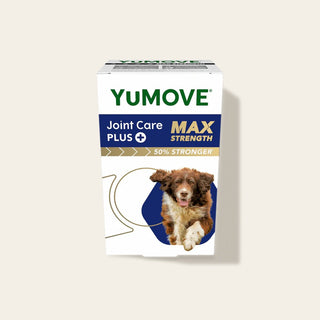

Silent signs of dental discomfort in dogs
Anyone who’s experienced dental issues will know it can make you really down in the mouth. Now imagine that feeling, while also not being able to tell anyone or do anything about it.
Well, that’s unfortunately the case for our beloved dogs. Dental issues in dogs can be particularly hard to spot, so we’ve put together a guide to help you get to the bottom of what your dog can’t tell you.

Why do dogs hide discomfort?
A dog’s natural instinct is often to hide any trouble they might be having. This dates back to their wild ancestors, who would hide discomfort to avoid being seen as an easy target for predators.
Plus, our pets will bend over backwards to please us. While we’re usually delighted to be on the receiving end of that affection, it’s hard to think that sometimes they’re putting on a brave face in order to greet us with a wagging tail. But don’t worry. We’re here to help you, help them.

Common signs of poor dental health in dogs
Of course, some signs are more obvious than others, such as seeing your dog pawing at their mouth, but many signs of poor dental health can be subtle. Let’s take a look:
-
Bad breath: contrary to popular belief, severe bad breath isn’t normal in dogs! It’s caused by a build-up of bad bacteria in the mouth, which can cause more serious issues if left untreated. Read about how to tackle bad breath in dogs.
-
Red or inflamed gums: this is one of the key early indicators of poor dental health. Have a check in your dog’s mouth (gently, and regularly) to know what’s going on.
-
Drooling: more saliva is naturally produced when there’s an issue in the mouth, so you may notice your dog drooling more than usual. This is often caused by gum conditions but can be caused by a wide range of dental or oral problems.
-
Bleeding from the mouth: sometimes the situation becomes so bad that the gums bleed. In this case, you should seek veterinary advice immediately. This can have other causes, too, and it's essential to get a professional opinion quickly. Read about gingivitis in dogs.
-
Changes to eating habits: this can range from a total lack of appetite to a reduced interest in hard food or treats. You may also notice your dog chewing on one side of their mouth, or dropping bits of food while they’re eating. Some dogs start to swallow their food whole, to avoid uncomfortable chewing. You may notice your dog is hungry and eager for food, but then turns their nose up at it once it arrives.
-
Changes in behaviour: your dog may paw at their mouth or become head shy, meaning they’re reluctant to let you touch their face. You may notice your dog lip-smacking or licking their lips. Scratching their ears and shaking their head can also be signs of dental problems. Crying during a yawn is another sign to watch for. What’s more, dogs with dental issues often don’t groom themselves properly, since their mouth is too uncomfortable.
-
Less specific signs: this can include lethargy (sleeping more than usual) and out-of-character hiding. These behaviours have many other causes, too, so speak to your vet.
- NO SIGNS! Let's not forget that often dogs don’t show any obvious signs that they are in dental discomfort, especially if it’s been present for a long time. This is one reason why it is so important to take your dog to have their mouth, gums, and teeth regularly checked by a vet. Just like us humans at the dentist.

And finally…
If you notice your dog showing any of the signs of dental discomfort mentioned here, or have any concerns about your dog’s oral health, then we recommend you pay a visit to your vet urgently. The sooner a dental issue is treated, the sooner your pup can feel happy again. Regular check-ups at the vet will mean you can nip any problems in the bud, too.
Remember, being proactive is always better than being reactive! Your dog’s teeth play a major role in their overall health, so keeping their gnashers in tip-top shape is key to their everyday happiness and wellbeing. And, after all, that’s what we want for them.
If you’d like to learn more about looking after your canine’s canines, check out our blog post that asks the question, ‘How healthy are your dog’s teeth?’ – or have a read through our Health Guides that cover all things dog.





